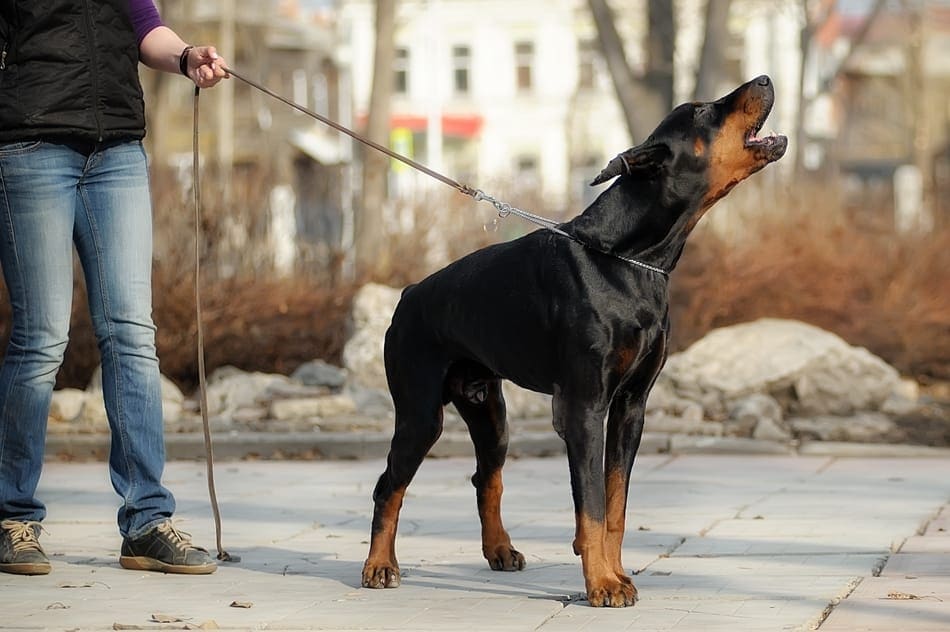
So you’re considering getting a Doberman, but you need to know how much Dobermans bark and how loud their bark is. How much any dog barks is definitely at least partially influenced by their genetics, and specifically what breed they are. Dobermans are no different. So let’s talk about how much Dobermans really bark, how loud it is, and how much trouble it might (or might not) cause with your neighbors.
Do Dobermans bark a lot? Dobermans were originally bred for protection work and as a result, they bark more than many other breeds, especially when on guard or attempting to alert their owners. However, they are also easily trainable and efforts by owners to prevent excessive barking are often successful.
A happy, trained, and socialized Doberman will generally only bark as a warning to their owner. However, a bored, frustrated, or poorly socialized Doberman may bark considerably more as a release for their anxiety.
Making sure a Doberman is a good fit for your lifestyle is an often-missed, but very important, step for someone considering becoming a new Doberman owner.
How Often Do Dobermans Bark?
The average Doberman owner can expect at least one short barking session of usually less than 30 seconds in length from their dog per day.
However, many Doberman owners experience no barking on a daily basis, while others will experience many long sessions of continuous barking. So what’s the difference between these two sets of owners and their dogs?
Much of the question of how often a specific Doberman will bark is based on variables such as:
- How much training the dog has received, including desensitization training to various barking stimuli.
- How much exercise the dog regularly receives.
- Availability of alternate outlets for the dog’s anxiety (toys, activities, etc).
- How well the dog has been socialized.
- How often and for how long they’re left alone.
- How much exposure the dog has had to different experiences.
- The frequency of outside barking stimuli (a dog on the other side of the fence, a delivery man coming to the door, etc).
- and other factors.
Since there are so many variables, it’s hard to predict precisely how often a specific Doberman will bark, but luckily there are a few common behaviors and reactions in the Doberman breed that do allow us to be able to somewhat predict what an owner is most likely to experience from a Doberman in terms of barking.
A well-trained and socialized Doberman will only bark when something very out of the ordinary is occurring, or if they’re alerting their owner. If you live in a highly-populated area, but your Doberman is left in a small apartment all day, your Doberman will have likely experience increased anxiety and bark more. If you live where there is no activity outside and he is exercised, socialized, and content, he will bark less. Sounds simple, and in a lot of ways, it is.
“90% of barking issues in Dobermans come down to one simple rule… as anxiety increases, so does barking. Lower anxiety levels mean less barking.”
– John Walter (DobermanPlanet.com)
Dobermans were originally developed to be a clingy, “velcro” type of dog that would act as a personal protection dog and protect their owner with force if necessary. As a guard dog breed, they were expected to bark a warning if an intruder was spotted or a dangerous person approached.
However, a guard dog that barks all the time is pretty much useless, since the owner rapidly learns to ignore the barking. So although barking while on alert was a trait Louis Dobermann (the creator of this breed) likely bred for originally, excessive barking was a trait that would have been avoided. If you are interested in learning more about the history of the Doberman breed, see the “history” section of my complete Doberman breed overview here.
The website Vetstreet, which ranks many common traits of various dog breeds ranks the barking tendency of a well-bred, happy, socialized, and trained Doberman as a two on a scale of one to five (source).
I’m certain that the biggest influences in this ranking for the Doberman is a balance between the Doberman’s instinctual tendency to “alert” their owners by barking and their extreme trainability and intelligence to discern what a real threat is.
If you need help on how to begin training your Doberman, see my guide all about how to train a Doberman Pinscher here.

Reasons Why Dobermans Bark
Simply, a well-bred, happy, socialized and trained Doberman is only going to bark when the time is appropriate. Examples would be such as in response to a command to bark, some forms of play, an intruder in your home, someone trespassing in your yard, or acting threatening towards a member of the family.
Dobermans who are poorly bred, poorly socialized, bored, or frustrated may bark because:
- They hear a benign noise.
- They see someone walking down the sidewalk.
- They see or hear another dog.
- Someone rang the doorbell.
- A car drives down the street.
- They hear people talking.
- A general increase in anxiety (including fear).
Most of the excessive barking examples listed above can be prevented by teaching your puppy what is normal (people walking down the sidewalk) and what is abnormal (someone climbing over your fence).
Incorporating adequate exercise and mental stimulation on a daily basis for your Doberman is another very common method for preventing this unwanted barking that is highly effective with this breed.
How Loud Is a Doberman’s Bark?
The average dog’s bark is between 80 to 90 decibels. The Guinness World Record’s record holder for the loudest bark is a Golden retriever named Charlie who hit 113 decibels. The previous record-holder was a German shepherd who hit 108 decibels. To put this into context, chainsaws are between 110-120 decibels, and power lawn mowers are at 96 decibels. Although certainly, a dog’s bark is much shorter in duration than either of these examples.
Since Dobermans were bred to be protectors, they have a naturally deep chest that easily allows them to make their presence vocally well-known and produce significantly loud barks.
One YouTuber named Joey Ferris recorded his Doberman Kruz’s bark at 128.7 dB (video above). This is equivalent to a military jet take-off (which is 130dB).
So how is it possible that Joey Ferris’s Doberman’s bark was louder than the world record holder? Well to be fair, I’m sure the Guinness Book of Records has specific requirements for measuring the volume of a dog’s bark, such as distance from the meter and other such variables. Even so, 128.7 dB measured in the manner in which Joey did from his Doberman, is still quite impressive (and loud)!
Most owners rank the loudness of their Doberman’s barking as being quite loud, almost as loud as a German shepherd’s typical machine-gun-style barking. If they bark, you will certainly hear it through walls, and your neighbors will definitely hear it, especially if the dog decides to bark at 3 am.
If you share a wall with a neighbor, such as in a townhouse or apartment, you should definitely take steps to ensure your Doberman’s barking is kept to a minimum. Those walls will seem paper-thin to your neighbors when your dog starts barking.
At What Age Do Dobermans Start Barking?
Generally, most breeds of puppies start barking between 7-8 weeks of age (source). However, owners of Dobermans will usually note that their pups will start barking a little later than this. By 10-12 weeks of age, you will notice your Doberman puppy being more vocal and barking during game time or when trying to get your attention.
However, at this age, the barking is not near as loud as an adult Doberman and certainly higher pitched.
Most Dobermans don’t start exhibiting “guarding” type barking until around 1 to 1.5 years of age, although they may bark for other reasons prior to that.

Stopping a Doberman From Barking
Here are six steps to stop your Doberman from barking:
- Determine why they’re barking.
- Reduce or eliminate the motivation to bark.
- Put your dog in tempting barking situations for training purposes.
- Give correction.
- Reward when not barking.
- Repeat as necessary.
You can find a more in-depth guide on these steps in the article I wrote, 6 Steps to Get Your Doberman Pinscher to Stop Barking here.
The first thing to do is to determine why the dog is barking and correct the problem. If the dog is barking because it’s left alone for 10 hours a day or is consigned to the backyard all of the time, it’s pretty clear what you have to do: fix the dog’s lifestyle.
Obviously, people do have to go to work, but if you get up early, take the dog for a good brisk walk or run, then engage in 15 minutes of advanced obedience training or some other mentally stimulating work. If you do this, the odds are that your dog will sleep all day instead of barking.
Once you get home, engage the dog in another bout of exercise and mental stimulation. Dobermans are very intelligent and athletic. They excel in many different dog sports, such as obedience, rally obedience, Schutzhund, agility, scent work, and tracking.
Practicing skills from these sports at home on a daily basis is a great way to give your Doberman a job to do and keep them mentally engaged. This will lead to an overall calmer dog.
“Teaching your dog a ‘stop barking’ command is a great first step in getting a handle on excessive barking. Teaching this isn’t as difficult as it sounds with a Doberman.”
– John Walter (DobermanPlanet.com)
If you plan to keep your dog in the backyard all of the time, don’t get a Doberman. They are clingy, “velcro” dogs, and need to be with their family as much as possible and the increased anxiety of being away from their family for a significant portion of the day will often lead to excessive barking.
If the dog is engaging in inappropriate “guarding” barking, like barking at people walking by across the street or in the neighbor’s yard, the best approach may be to work with an experienced trainer to teach the dog when it’s appropriate to bark and when it’s not.
When Can You Start Training a Doberman Not to Bark?
Immediately! Start training your Doberman in obedience, appropriate guard/alert barking, and general good manners the second you bring the dog home. Young puppies are learning sponges; good breeders start training puppies as soon as their eyes open.
Many commands can be taught easily at home to Dobermans at 8 weeks of age. You can start making significant progress in teaching more advanced behaviors in Dobermans starting as early as 12 weeks of age.
TIP
One great way to prevent barking, is actually to teach the “speak” command so that your Doberman understands when the appropriate time to bark is. To learn how to do this, see my article all about training a Doberman to bark on command.
Other Common Behavioral Problems in Dobermans
While barking is certainly a common behavior problem with some Dobermans due to their natural guarding instincts, this breed is known for other issues as well. Some of these can be related to, or incorporate, barking issues into them.
Probably one of the most common behaviors in Dobermans is flank-sucking. Almost all of them will do this to some extent. This is considered to be an obsessive-compulsive disorder.
The dog engages in sucking on its flank (the flap of skin connecting the dog’s lower torso to their back legs), a toy, or blankets. In mild cases, the dog just seems to enjoy doing it or does it to relieve stress and can easily be distracted from sucking. In severe cases, the dog won’t stop the flank-sucking and this can result in self-mutilation and even the need for medication to treat the condition.
Other common behavioral issues in Dobermans include:
- Separation anxiety (which can cause destructiveness, barking, and crying).
- Fear-based aggression if poorly bred or undersocialized.
- Destructiveness if bored or under-stimulated.
- Resource guarding.
- Intolerance of other dogs.
- Chasing cats and other small animals (especially furry ones).
The first step in preventing behavioral problems is to ensure a Doberman fits into your lifestyle before acquiring one. These are dogs that need a lot of exercise and attention; if you can’t provide what a Doberman needs, choose another breed. But if you have the motivation and desire to adapt to your dog, as much as they will need to adapt to you, then you can be successful in raising a Doberman.
The next step is to be sure you only buy your puppy from a reputable, responsible breeder who breeds for a Doberman temperament that fits with your lifestyle.
The third step in dealing with behavioral problems is to simply put the effort into providing your dog with the stimulation, training, and guidance that they need. I rarely see a Doberman owner who is willing to put in significant effort and still fails. If the effort, desire, and willingness are there on your part, then you’ll be successful with your Doberman.


